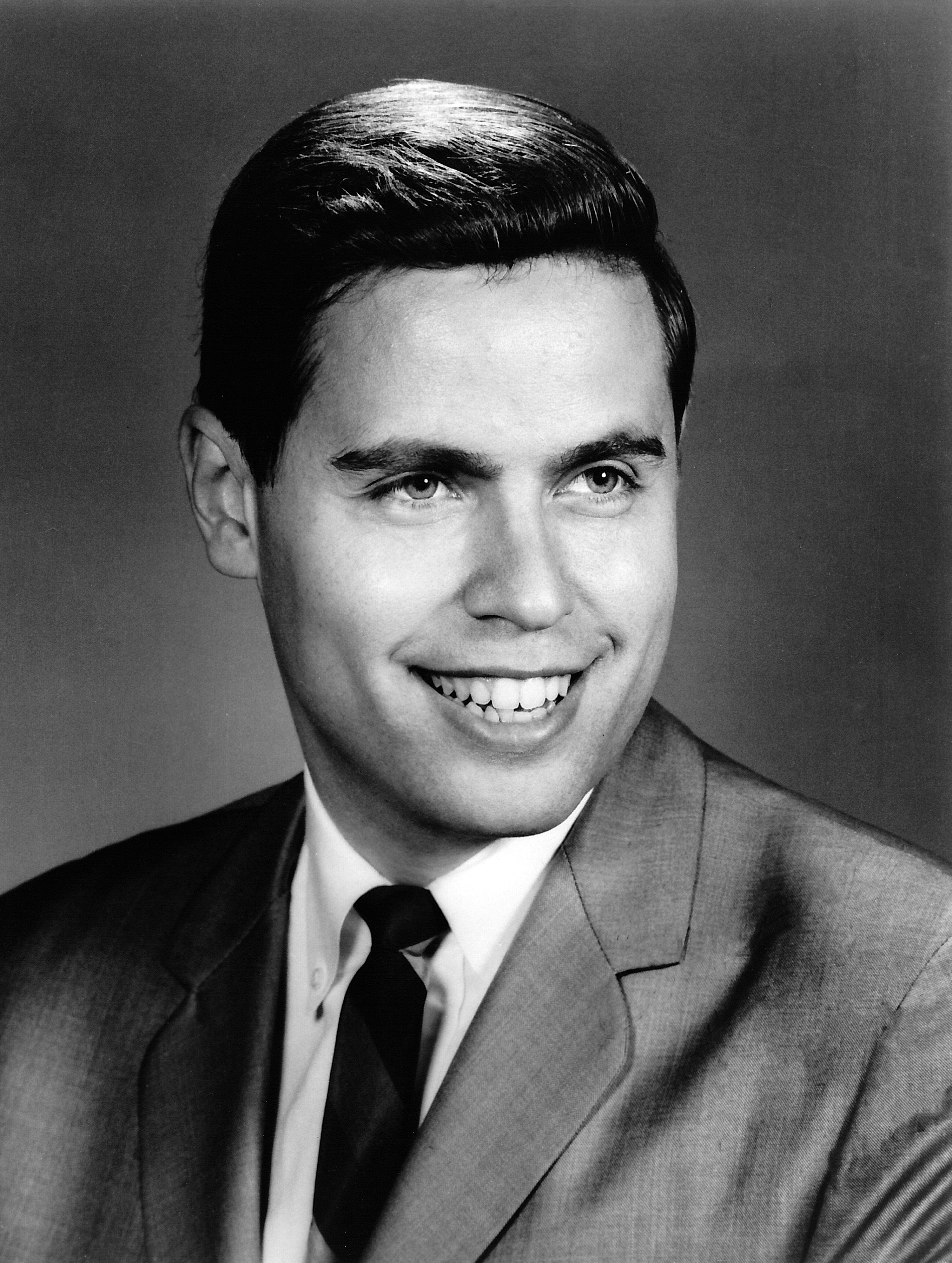
BOB GREEN * HELLO DETROIT * BOB GREEN PRODUCTIONS
![]()
From the MCRFB desk of Jim Feliciano
Anita Kerr Sings Different Note On The Radio Recording Custom Jingles
“You can bet when your dial is set, to the last four letters of the alphabet, WXYZ the big four — WXYZ, you get more!”
WXYZ-AM 1270 PERSONALITY-PLUS Jingles Package 1966 ( 6:29 audio)
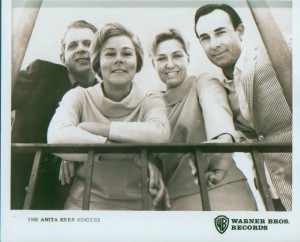
Let’s rewind back to 1966. If your AM dial was set on the radio here in Detroit to 1270, you may still remember listening to one of the most beautiful jingles packages ever produced for Detroit radio during that time. The Anita Kerr custom-series jingle package for WXYZ AM.
But first just who was Anita Kerr?
Insofar as mainstream music popularity goes, and by name definition, not much had been known or had been publicized about her back when, outside a few music-trade publications.
Anita Jean Grilli (Anita Kerr) was born in Memphis, Tennessee, on October 31, 1927. According to her biography, Anita took an early exposure to music early on during her childhood when she first appeared on her mother’s radio show in Memphis. During her teen years in high school there, she expanded her musical talents by forming her own singing group. As a youngster then, she also demonstrated maturity for writing music as well.
In 1949, she went on to form a singing group, the Anita Kerr Singers, which she later trimmed down to a quartet. Anita Kerr as soprano, Gil Wright as tenor, alto Dottie Gillard, and Louis Nunn as baritone. Eventually, the Anita Kerr Singers played on local radio and gained exposure on NBC television’s ‘Sunday Going South.’ The group’s talent for good music gained in popularity while in hometown Memphis, and in 1951, Decca Records signed the group as studio backing singers for their recording label.
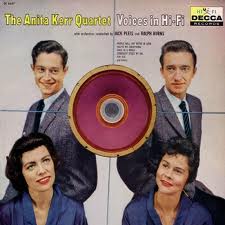
In 1956, the Anita Kerr Singers made an appearance on the Arthur ‘Godfrey’s Talent Scouts’ show on CBS television. The group also made gains with an appearance on the Jim Reeves Show in 1958. The group also went on to record an album as well, ‘Voices In Hi-Fi,’ which Decca released in 1958.
By the end of the 1950s, the group had signed over with RCA Records. Chet Atkins, the head of the Country Music Division of RCA, integrated Kerr’s talents to help facilitate a new “Nashville Sound.” The new “sound” Atkins produced was primarily intended to be more mainstream and appealing for the pop music scene at the time in the early 1960s. By adding strings and Anita Kerr’s vocal backings, along with the Jordanaires, RCA went on to introduce mainstream America with a brand new sound for country music. In crossing over, they called it, “Countrypolitan.”
During that time as well, Anita Kerr became more involved behind-the-scenes with the studio production facets at RCA. Now utilizing her talents elsewhere for Chet Atkins there, she was instrumental in producing orchestral arrangements for other RCA country recording artist as well, such as Skeeter Davis’ 1963 country/pop hit, “The End Of The World.” The group went on to back many other country artists on RCA as well, including Hank Snow, Jimmy Reeves, Floyd Cramer, Dottie West, Roy Orbison, and many, many more.
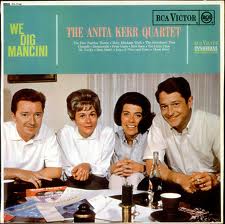
In 1965 the Anita Kerr Singers reached a high point by winning two Grammy awards. They were awarded for Best Performance By A Vocal Group for their RCA album, ‘We Dig Mancini,’ edging out the Beatles’ ‘Help!’ album in that category. The group also won the Best Gospel Album category by collaborating with George Beverly O’Shea in the 1964 RCA album release, ‘Southland Favorites.’
Anita Kerr Enterprises, 1965
Later on in the same year, according to a brief article in the October 16, 1965 edition of Billboard magazine, Anita Kerr moved to Hollywood from Nashville to form Anita Kerr Enterprises to work in the commercial radio and jingle industries. In concert with former RCA Victor European sales administrator, Alexandre Grob, they also obtained the services of Charlie Williams, former songwriter and personal manager at RCA Records. While on the west coast, Anita still continued to work with her Nashville singing group which bears her name, and stated of her intentions in bringing the other members of the singing group to California to record jingles. The singers will remain as an act for the RCA label, according to the Billboard brief.
By 1967 Anita Kerr Enterprises had recorded jingles for various radio clients across the country, including KMPC AM 710 in Los Angeles, California; WLS AM 890 in Chicago, Illinois, WGH AM 1310 in Newport News, Virginia, and WXYZ AM in Detroit.
At WXYZ AM 1270 here in Detroit, Lee Alan was program director for WXYZ-AM. In late 1965, new changes were being implemented at the station for the coming new year for 1966. Lee Alan personally wrote and composed the “Personality Plus” jingles series for the coming new “Detroit Sound Survey.” WXYZ-AM, at the time, was a Detroit affiliate and owned by the ABC Radio Network in New York.
Once approval had been attained for Lee Alan to proceed with the station’s new “Personality Plus” custom package, ABC in New York sanctioned station General Manager Chuck Fritz’s request to allow Lee Alan to hire Dick Marx Productions in Chicago “to finish the arrangements and contract with Anita to do the singing,” Lee Alan said. “Years earlier Dick (Marx) had produced the jingles for sister station WLS-AM in Chicago.”
Lee Alan further stated that, “the series were carefully crafted to upgrade and change the sound of WXYZ. I produced the package with Dick Marx in Chicago. We hired Anita Kerr and her back-up singers who recorded everything in two sessions in over a two day period.
“Later I was asked to write and produce another series for WXYZ-FM which was affected by the ‘broadcast separately from AM’ by FCC rules. At he same time I wrote and produced the opening jingles for the new ‘Martin and Howard’ show which began in 1967. For each production session I hired Dick Marx and contracted with Anita Kerr,” Lee Alan went on to conclude (see Lee Alan’s comments below; dated July 2, 2012).
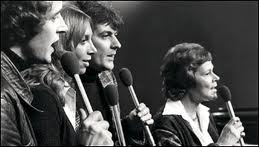
After a trip to Europe in late 1967, Anita Kerr disbanded the group before signing over with Warner Brothers Records. But once again, she formed a new group of Anita Kerr Singers under the Warner label. The new group features tenor Gene Merlino, bass Bob Tedow, and sopranos Jackie Ward and B. J. Baker. They produced two albums for Warner records, both albums were produced with Warner Bros. recording artist Rod McKuen. The first album was entitled, ‘The Sea’ which became a best-seller in 1967. In late 1968, the group released their second album with McKuen. Their second LP was entitled, “Home By The Sea.’ In both albums, Anita composed the music and Rod McKuen wrote the lyrics to the songs.
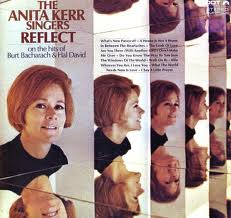
In 1969, Anita Kerr made a move over to Dot Records. While at Dot Records, the group won the Edison Award for their first album under the new label, The Anita Kerr Singers Reflect On The Hits Of Burt Bacharach And Hal David.
According to the Wikipedia website, Anita Kerr received a special ASCAP Award in 1975, in recognition of her efforts “as a first class musician for her significant contributions to the birth and development of the Nashville Sound.” In 1992, the National Academy of Recording Arts and Science (NARAS) gave Anita Kerr the NARAS Governors Award “in recognition of her outstanding contributions to American music.”
But once again, in closing, listen closely to those classic jingles Anita Kerr had recorded for WXYZ radio in 1966. We’re certain you’ll agree this custom-package was one of the most beautifully arranged set of jingles that was ever produced for Detroit radio during the 1960s.
And we certainly would have to especially thank Lee Alan for making this beautifully written WXYZ custom series package we’ve featured here for making this all happen all the more in 1966.
___

![]()
 From the MCRFB NEWS archive: 1967
From the MCRFB NEWS archive: 1967
R&B Radio Outlets Richer; Static Quo on DJ Dollars Dismal
NEW YORK — The current success of many R&B format radio stations across the nation “is not that all apparent at the deejay level,” according to Ronnie Roker, an executive at Mark II Records.
Mark II records is the label of Tag LTD. Productions, a firm headed by Magnificent Montague, former air-personality with KGFJ, Los Angeles, and Roker, formerly with Liberty Records. The label’s first release is “Precious Memories” by the Romeos, now No. 38 with a star on the R&B chart, and climbing also on the Hot 100 Chart in pop sales. Montague played congos and bongos on the record. The LP is due out soon featuring the group.
The record got its start on R&B stations; among those that helped boost it were WVON, Chicago; WWIN and WEBB in Baltimore; WABQ and WJMO in Cleveland; KGFJ in Los Angeles, KATZ in St. Louis, and WJLB and WCHB in Detroit. It was WQV in Pittsburgh, Roker said, that swung the record into the pop field and did so much to promote record sales.
Format Operation
 R&B stations — practically all major ones — have gone to a format operation, Roker said. “Format lessens the amount of new records exposed, although the number of records exposed on R&B radio stations far surpass that on pop stations. Its much easier to get a record started in the R&B field, though not as easy as five years ago. Today, you have to put out a good record to get it played. There are very few bad records — or even mediocre ones — played on any R&B station.”
R&B stations — practically all major ones — have gone to a format operation, Roker said. “Format lessens the amount of new records exposed, although the number of records exposed on R&B radio stations far surpass that on pop stations. Its much easier to get a record started in the R&B field, though not as easy as five years ago. Today, you have to put out a good record to get it played. There are very few bad records — or even mediocre ones — played on any R&B station.”
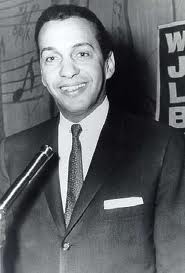
The tight formats now being used by R&B stations have really helped them, Roker felt. “It has been responsible for higher ratings of these stations in the general market, bringing them more business and higher advertising rates.” But this hasn’t helped most deejays, he said; their salaries haven’t been increased or, at least, it’s “not that apparent.” Roker said he felt deejays should share in the growth of the stations through higher salaries, “but whether they will is a different matter.” END
___
(Information and news source: Billboard Magazine; April 29, 1967)
Addendum: Here are two *rare* airchecks of Detroit’s own R&B Grandmaster himself, “Frantic” Ernie Durham, as he was 10 years earlier on R&B WBBC-AM in Flint, Michigan, in 1957 and in 1958.
From the MCRFB Aircheck Library, featuring:
WBBC-AM Ernie Durham: Ernie Durham – WBBC – Flint – November 1957.mp3
WBBC-AM Ernie Durham: Ernie Durham – WBBC – Flint – November 1958.mp3
![]()
 From the MCRFB Aircheck Library: WKNR
From the MCRFB Aircheck Library: WKNR
Steve Robbins on 1310 AM WKNR “Keener 13” 1967
 “In Detroit for the first time. You heard their records. You seen them on TV. Now see them in person! The Monkees in person at Olympia Stadium 7:30 Saturday. KEENER presents the MONKEES!” — Paul Cannon, WKNR
“In Detroit for the first time. You heard their records. You seen them on TV. Now see them in person! The Monkees in person at Olympia Stadium 7:30 Saturday. KEENER presents the MONKEES!” — Paul Cannon, WKNR
THE MONKEES ARE COMING! KEENER 13 Brings the Monkees to Olympia, January 14, 1967
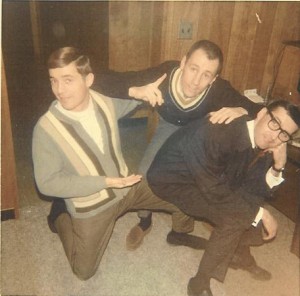
….The Monkees are coming, right?…
On Saturday, January 14, 1967, WKNR “Keener 13,” in conjuction with Dick Clark Productions, sponsored the biggest Detroit concert event since WKNR brought the Beatles to Olympia Stadium on August 13, 1966.
…. No. 1., what a perfect song by the perfect group, the Monkees on Keener 13…
When this classic WKNR aircheck was recorded on Friday, January 13, 1967, you can sense the exuberance and euphoria for the anticipated arrival, then, of the band’s arrival here in the Motor City for the very first time.
There was a “lot of excitement around here,” at the station at the time, said Keener deejay Steve Robbins on his show just twenty-four hours before the Monkees would take to the stage at the Olympia, Saturday night, January 14, 1967. The Olympia Monkees event eventually sold out.
Moving swiftly from city to city across the country, the Monkees 1966-1967 North American Tour was such a success that it was extended further into late-August of that year by popular demand. WKNR would again sponsor the Monkees return back to Detroit at the Olympia once again, this time it was scheduled for Saturday, July 29, 1967.
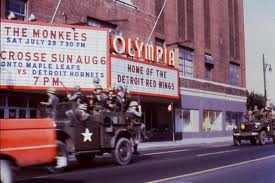
But in the early hours of Sunday, July 23, 1967 Detroit erupted in flames. Due to the civil unrest and local and federal curfews imposed during the riots, the pre-scheduled show was immediately canceled.
Keener deejay J. Michael Wilson issued this WKNR-released statement on Wednesday, July 26 during his 10 PM show:
“Here’s an important announcement regarding the Monkees appearance in Detroit. In case you missed it, the concert at Olympia Stadium scheduled Saturday, July 29 has been postponed. The new date has not been determined at this time. Please hold on to your Monkees tickets. When a new date has been set it will be announced on WKNR. Do not call WKNR or Olympia. Stay tuned to Keener for information regarding the Monkees concert — repeating — the Monkees concert sheduled for July 29 has been postponed. No new date has been set at this point. Hold on to your Monkees tickets and stay tuned to Keener for further information. Do Not call WKNR or Olympia.”

Ultimately, the Detroit-canceled July 29 Monkees concert was rescheduled for Sunday, August 13, 1967 — a year to the day WKNR brought the Beatles back to Olympia in August 1966.
In January of 1967, Keener “fill-in” Steve Robbins was sharing on-air duties on a part-time basis at the WKNR-FM studios, while sharing some air-time there with Keener FM deejay Bob Harper. Just the same, at the time Robbins was still doing his full-time show during the week at WKFR in Battle Creek’s “Keener 14” under the name Steve Clark. When Jim Jeffries left WKNR the latter-part of 1967 for WQXI in Atlanta, Steve left WKFR to become the new overnight deejay on Keener 13.
This week, unexpected news came that Davy Jones, formerly of the Monkees, passed away suddenly at the age of 66 on February 29. But for a just brief moment in time, MCRFB will take you back in 1967 when “Monkeesmania” was widespread and prevalent here in the Motor City and the Monkees and WKNR was at the top at No. 1. “THE MONKEES ARE COMING!”
From the MCRFB Aircheck Library, featuring:
___
WKNR-AM * Steve Robbins * (Monkeesmania!) January 13, 1967

Bob Green talks to Davy Jones of the Monkees, 1967
WKNR-AM * Bob Green * Davey Jones Interview (Monkees) 1967

(Keener deejays 1967 photograph, top, courtesy the Art Vuolo collection)
![]()
Walt “Baby” Love on 800 AM CKLW 1970
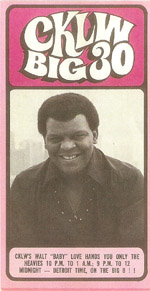 “CKLW on a solid gold weekend answering a hit line request from Detroit” —
“CKLW on a solid gold weekend answering a hit line request from Detroit” —
When these Walt “Baby” Love airchecks were recorded in 1970, the Bill Drake era had catapulted CKLW to No. 1 in radio ratings in Motown. The Big 8 was the most listened to radio station in Detroit, Toledo, Cleveland, and in Windsor, Sarnia, Leamington, Ontario and beyond.
With 50,000 watts of pure-enery emanating from the AM 800 transmitter towers outside it’s studios, the nighttime coverage was even more widespread after sundown. Reportedly at times, the CKLW signal could clearly be heard bouncing across four Provinces in Canada and in 28 states. The ‘CK signal had been picked up going far east well into Connecticut, and on some nights deep down into Florida as well.
But it was the Drake-Chenault format that drove the station to the very top. Tight and innovating, it moved faster than the competition drawing more emphasis on the playlist with less talk. By the early 1970s, CKLW was the most listened to radio station here in the Motor City.
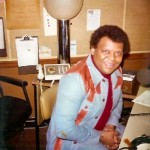 Walt “Baby” Love became the first Black on-air talent at RKO radio, hosting radio shows at CKLW and WOR FM radio in New York City. He has held on-air positions at WNBC, WBLS and 99X, all located in New York City, as well as KHJ, KMPC and KFI Los Angeles. Walt was also Urban Radio and Music Editor at the Radio & Records publication for 21 years.
Walt “Baby” Love became the first Black on-air talent at RKO radio, hosting radio shows at CKLW and WOR FM radio in New York City. He has held on-air positions at WNBC, WBLS and 99X, all located in New York City, as well as KHJ, KMPC and KFI Los Angeles. Walt was also Urban Radio and Music Editor at the Radio & Records publication for 21 years.
In 2005, Walt Love earned a Master of Arts degree in Theology from Fuller Theological Seminary of Pasadena, California. Today, Rev. Walt Baby Love currently resides in Los Angeles with his wife Sonya and son Stephen.
CKLW – WALT “BABY” LOVE – 1970

![]()
 Detroit Free Press: ‘TEEN BEAT’ Interviews Marvin Gaye, 1966
Detroit Free Press: ‘TEEN BEAT’ Interviews Marvin Gaye, 1966
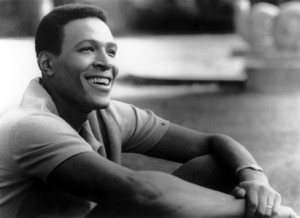
During 1966, Detroit’s morning paper, the Detroit Free Press ran a weekly feature on Fridays called ‘Teen Beat.’
The feature article would comprise of interviews, photos, the music, the fads and anything else that was of special interest to the teenage scene in Detroit during that time.
Here is a rare, recorded interview Marvin Gaye gave to Teen Beat with Loraine Alterman. Loraine was the teen-editor for the Detroit Free Press when she interviewed Marvin Gaye for the Free Press column at the time.
Listen in once again as Marvin answered some of Alterman’s questions, such as,
What do you think of ‘Mod’ clothes and long hair? What’s your favorite record? Whose your favorite singer? If you were not a singer, what would you like to be? How do you like living in Detroit?
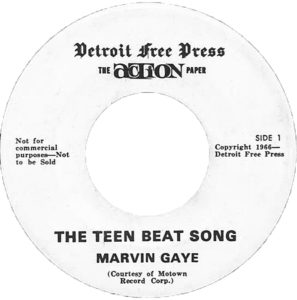
In 1966, Marvin Gaye even recorded a song for the Detroit Free Press’ Teen Beat on Motown Records, but the recording was intended only for non-commercial distribution and was not to be sold. And we’ll include that M.G. rarity here as well. And who knows? Maybe you might have read about this same Marvin Gaye interview in Teen Beat one Friday morning a long time ago, just before you went off to school.
Teen Beat. Fridays. “Only in the morning Free Press.”
MARVIN GAYE * THE TEEN BEAT SONG * 1966
LORAINE ALTERMAN * INTERVIEW * MARVIN GAYE * 1966

![]()

WWWW * 106 FM * 1970

![]()
 Canadian Girl Singer Hails from Richmond Hill, Ontario
Canadian Girl Singer Hails from Richmond Hill, Ontario
S A N D Y S E L S I E .
IF YOU WERE TO DO A SEARCH on the world-wide web, not much information can be found on the Internet today regarding, Sandy Selsie.
All that has been primarily known about Sandy Selsie was that she had several country/pop singles in the early-1960s on the Columbia record label. And that she originally was from Canada. And that’s just about it.
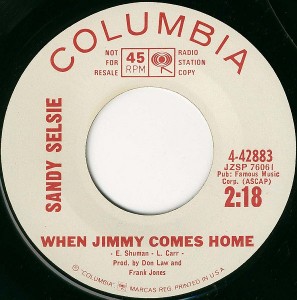
But there was a detailed mention about this female Canadian artist on a Yahoo message board, which I recently found on the Spectropop blog site message forum.
A poster there, who goes by the name of “Boris” laid claims he resides in Ottawa, Ontario in Canada. An avid record collector on “girl/girl groups” since the early-nineties, and in researching Canadian recording artists, he stated he once had gone to the Canadian National Archives library and came across a newspaper article on Sandy Selsie, which appeared in the local Richmond Hill, Ottawa newspaper called The Liberal.
Accordingly, the article first appeared in 1963. The article had stated Sandy Selsie hailed from Richmond Hill, Ontario, now a large suburb outside of Toronto.
Back in 1963, according to The Liberal article, Sandy Selsie was a grade 10 student who attended Bayview High School in Richmond Hill, at the age of 15. Her father, Fred Selsie was her talent-manager during that time. Mr. Selsie was instrumental in signing a 5-year contract for Sandy with Columbia Records earlier in 1961. Her first recording for the label was, “A Date With Loneliness” which was released in November of that year.
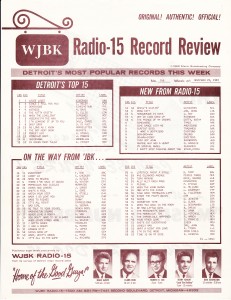
The article quoted Sandy Selsie as stating how her career came into prominence early-on. “I started out singing in the area shows. And gradually branched over to radio and television. I’ve had guest spots on the Country Hoedown television show as well as appearances on the Tommy Hunter radio show.”
The article also stated her big break happened when the family took a vacation down to Nashville, Tennessee, early in 1961.
“We were down there on our vacation. And we decided I should drop in to Columbia Studios for an audition.” She was signed immediately. “I was really surprised, because it’s unusual for a big recording studio to sign you just like that.”
In closing the article, Sandy Selsie expressed her desires in pursuing a Major in Performing Arts.
On a small note, as it were, Columbia Records initially released Sandy Selsie’s “When Jimmy Comes Home” in November, 1963. The song debuted on the CHUM playlist early-on in November in Sandy Selsie’s own home-town. Just the same, the song would find it’s way over to CKEY 580 AM in Toronto about the same time-frame.
Locally, the Selsie song made it’s way over here on Detroit radio, “When Jimmy Comes Home” debuted first on WJBK Radio 1500 on Friday, November 15, 1963.
Six days later, it debuted at the #30 spot on the WKNR Keener 13 playlist for Thursday, November 21, 1963. On a local level, the song didn’t stay long on the charts here in Detroit. But after having first heard it played on WKNR late in 1963, personally, this Sandy Selsie classic will always be a great Keener song memory from that year.
While certainly there weren’t too many, this long forgotten, obscure song as was recorded by Sandy Selsie, arguably, may well have been the greatest “Jimmy” song that was ever recorded in the Top 40 era.
— M O T O R C I T Y R A D I O F L A S H B A C K S
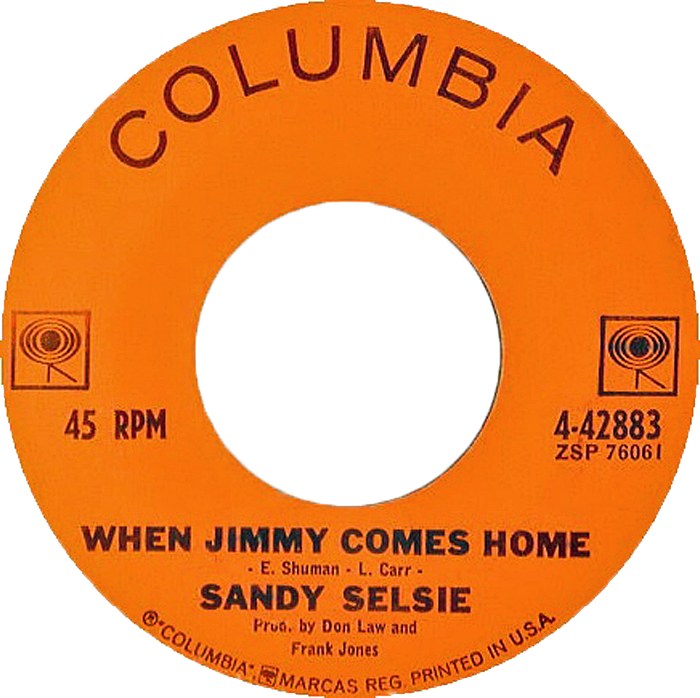

![]()